A Classical Ethical Theory Perspective on the Net Neutrality Debate
VerifiedAdded on 2023/06/12
|9
|2240
|213
Essay
AI Summary
This essay provides an ethical analysis of net neutrality using four classical ethical theories: utilitarianism, deontology, virtue ethics, and contract theory. It examines the arguments for and against net neutrality, considering the perspectives of internet service providers, consumers, and businesses. The essay explores how each ethical theory frames the debate, highlighting the potential benefits and drawbacks of net neutrality policies. It concludes that while net neutrality may benefit consumers by preventing biased service and promoting a level playing field, it could also pose challenges to businesses and institutions by potentially stifling competition and increasing costs. The essay references various sources to support its analysis and offers a nuanced perspective on the complex ethical considerations surrounding net neutrality.
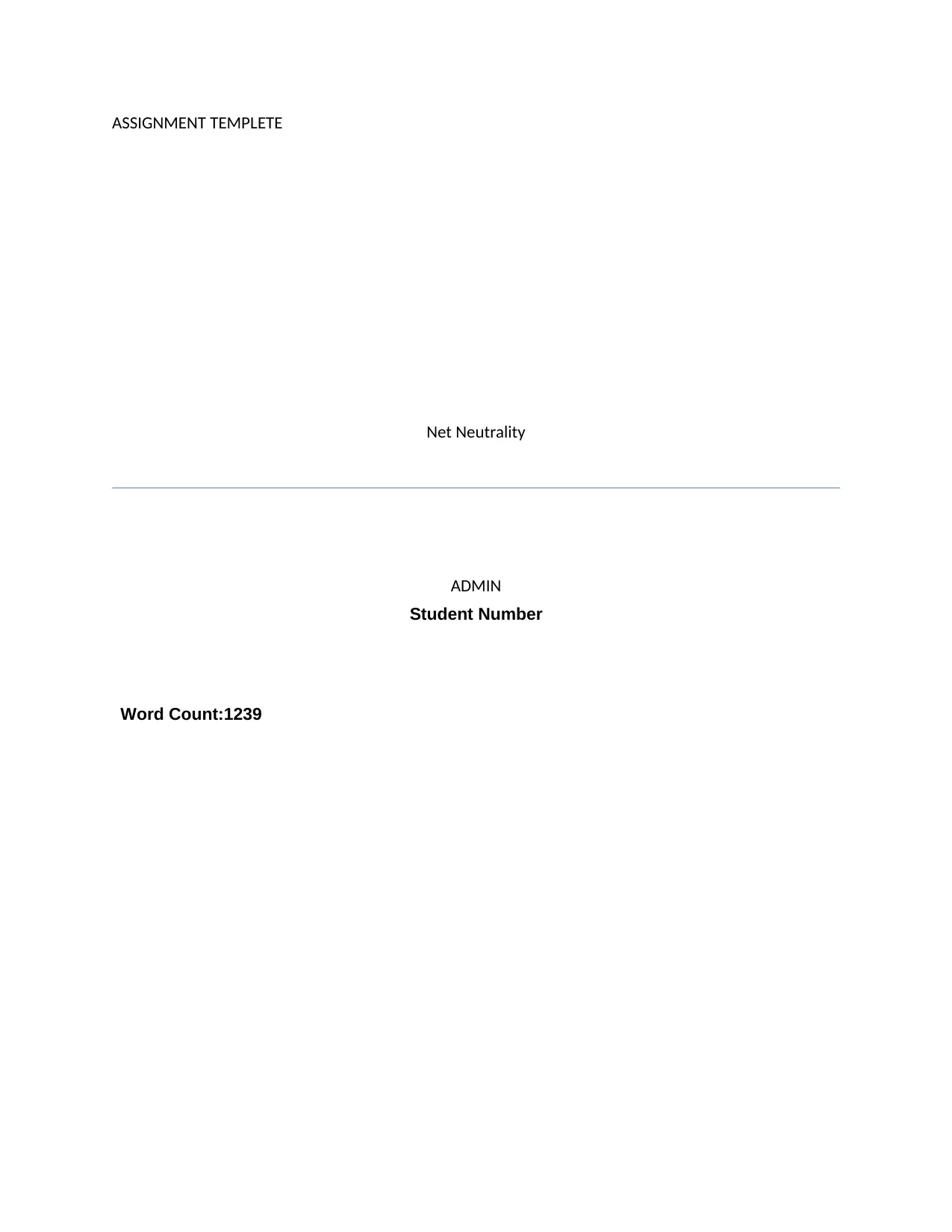
ASSIGNMENT TEMPLETE
Net Neutrality
ADMIN
Student Number
Word Count:1239
Net Neutrality
ADMIN
Student Number
Word Count:1239
Paraphrase This Document
Need a fresh take? Get an instant paraphrase of this document with our AI Paraphraser
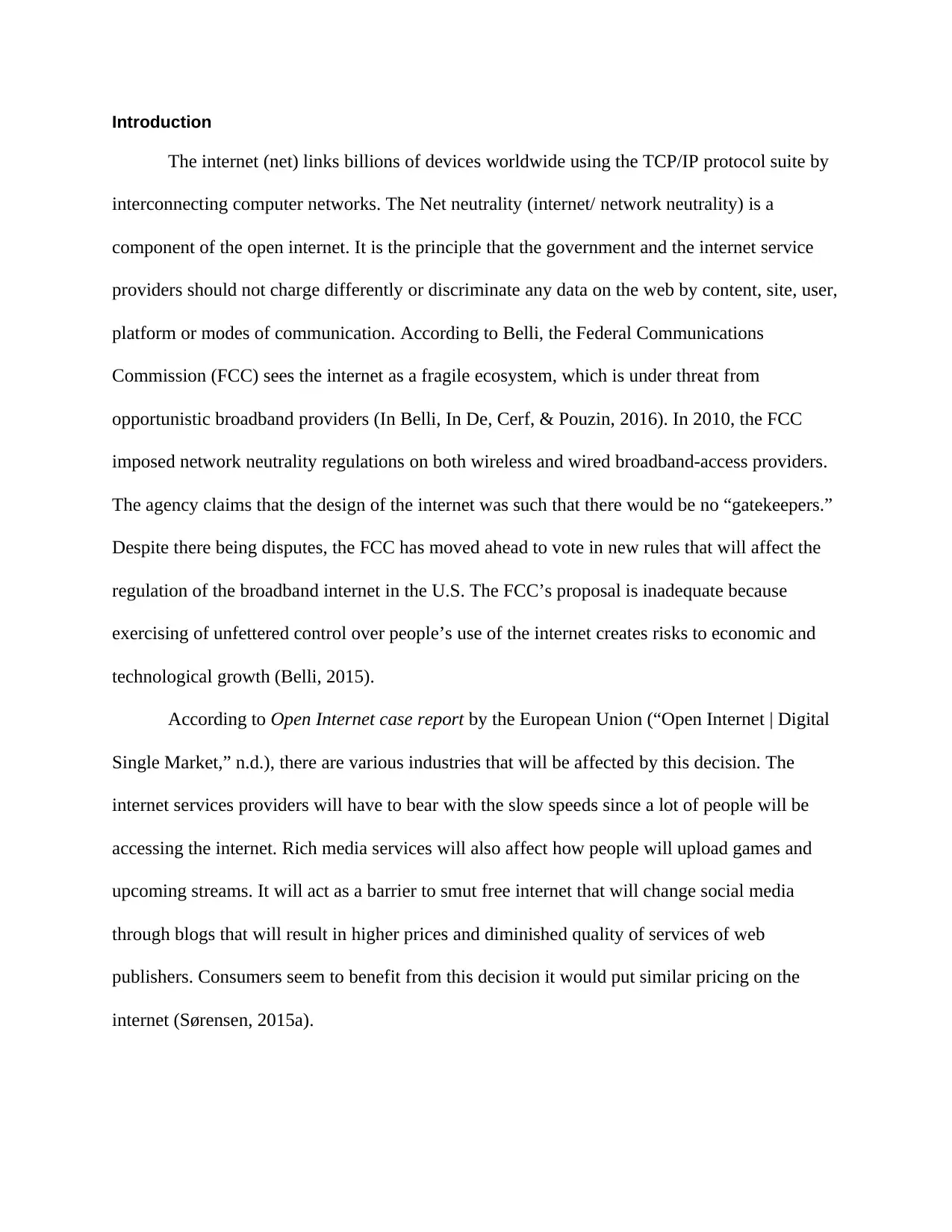
Introduction
The internet (net) links billions of devices worldwide using the TCP/IP protocol suite by
interconnecting computer networks. The Net neutrality (internet/ network neutrality) is a
component of the open internet. It is the principle that the government and the internet service
providers should not charge differently or discriminate any data on the web by content, site, user,
platform or modes of communication. According to Belli, the Federal Communications
Commission (FCC) sees the internet as a fragile ecosystem, which is under threat from
opportunistic broadband providers (In Belli, In De, Cerf, & Pouzin, 2016). In 2010, the FCC
imposed network neutrality regulations on both wireless and wired broadband-access providers.
The agency claims that the design of the internet was such that there would be no “gatekeepers.”
Despite there being disputes, the FCC has moved ahead to vote in new rules that will affect the
regulation of the broadband internet in the U.S. The FCC’s proposal is inadequate because
exercising of unfettered control over people’s use of the internet creates risks to economic and
technological growth (Belli, 2015).
According to Open Internet case report by the European Union (“Open Internet | Digital
Single Market,” n.d.), there are various industries that will be affected by this decision. The
internet services providers will have to bear with the slow speeds since a lot of people will be
accessing the internet. Rich media services will also affect how people will upload games and
upcoming streams. It will act as a barrier to smut free internet that will change social media
through blogs that will result in higher prices and diminished quality of services of web
publishers. Consumers seem to benefit from this decision it would put similar pricing on the
internet (Sørensen, 2015a).
The internet (net) links billions of devices worldwide using the TCP/IP protocol suite by
interconnecting computer networks. The Net neutrality (internet/ network neutrality) is a
component of the open internet. It is the principle that the government and the internet service
providers should not charge differently or discriminate any data on the web by content, site, user,
platform or modes of communication. According to Belli, the Federal Communications
Commission (FCC) sees the internet as a fragile ecosystem, which is under threat from
opportunistic broadband providers (In Belli, In De, Cerf, & Pouzin, 2016). In 2010, the FCC
imposed network neutrality regulations on both wireless and wired broadband-access providers.
The agency claims that the design of the internet was such that there would be no “gatekeepers.”
Despite there being disputes, the FCC has moved ahead to vote in new rules that will affect the
regulation of the broadband internet in the U.S. The FCC’s proposal is inadequate because
exercising of unfettered control over people’s use of the internet creates risks to economic and
technological growth (Belli, 2015).
According to Open Internet case report by the European Union (“Open Internet | Digital
Single Market,” n.d.), there are various industries that will be affected by this decision. The
internet services providers will have to bear with the slow speeds since a lot of people will be
accessing the internet. Rich media services will also affect how people will upload games and
upcoming streams. It will act as a barrier to smut free internet that will change social media
through blogs that will result in higher prices and diminished quality of services of web
publishers. Consumers seem to benefit from this decision it would put similar pricing on the
internet (Sørensen, 2015a).
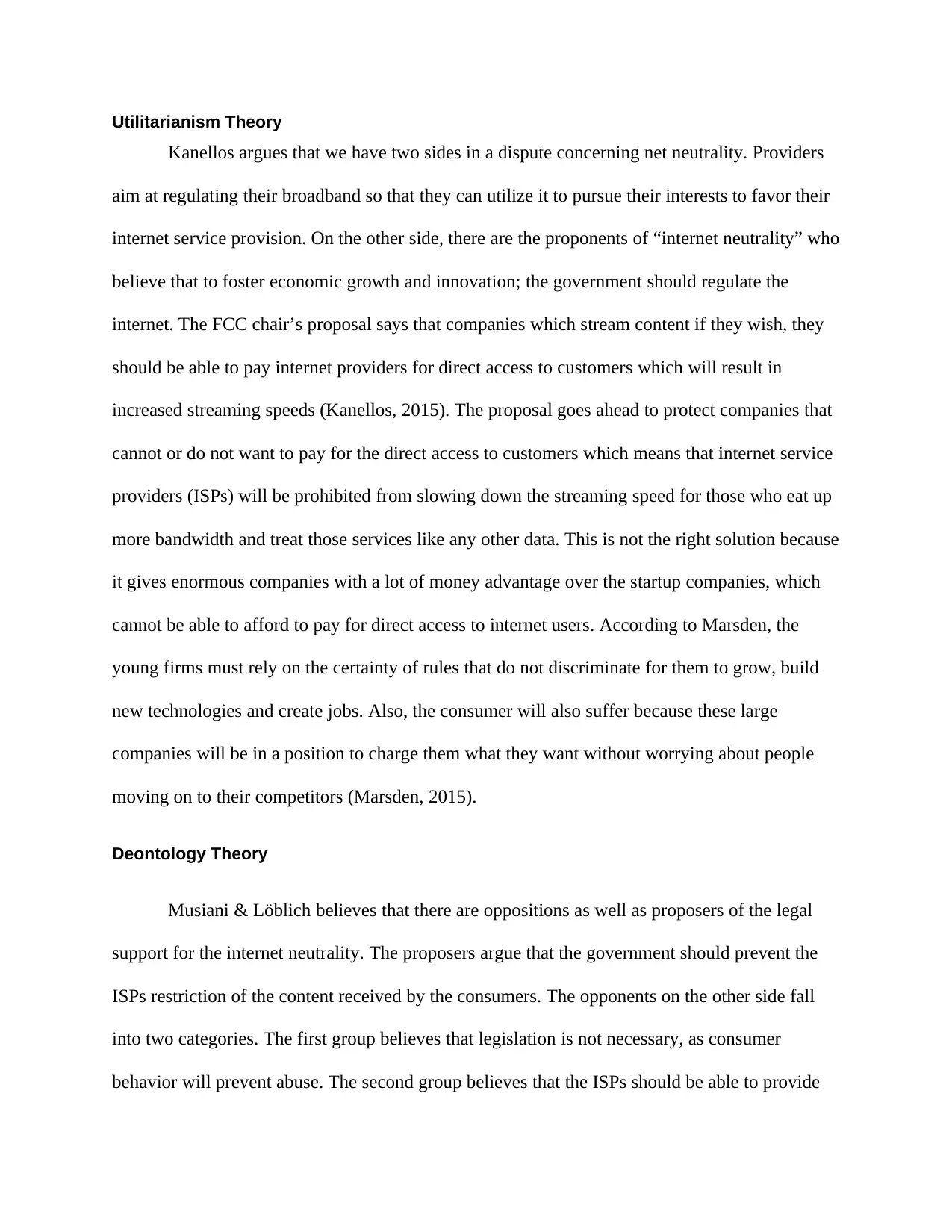
Utilitarianism Theory
Kanellos argues that we have two sides in a dispute concerning net neutrality. Providers
aim at regulating their broadband so that they can utilize it to pursue their interests to favor their
internet service provision. On the other side, there are the proponents of “internet neutrality” who
believe that to foster economic growth and innovation; the government should regulate the
internet. The FCC chair’s proposal says that companies which stream content if they wish, they
should be able to pay internet providers for direct access to customers which will result in
increased streaming speeds (Kanellos, 2015). The proposal goes ahead to protect companies that
cannot or do not want to pay for the direct access to customers which means that internet service
providers (ISPs) will be prohibited from slowing down the streaming speed for those who eat up
more bandwidth and treat those services like any other data. This is not the right solution because
it gives enormous companies with a lot of money advantage over the startup companies, which
cannot be able to afford to pay for direct access to internet users. According to Marsden, the
young firms must rely on the certainty of rules that do not discriminate for them to grow, build
new technologies and create jobs. Also, the consumer will also suffer because these large
companies will be in a position to charge them what they want without worrying about people
moving on to their competitors (Marsden, 2015).
Deontology Theory
Musiani & Löblich believes that there are oppositions as well as proposers of the legal
support for the internet neutrality. The proposers argue that the government should prevent the
ISPs restriction of the content received by the consumers. The opponents on the other side fall
into two categories. The first group believes that legislation is not necessary, as consumer
behavior will prevent abuse. The second group believes that the ISPs should be able to provide
Kanellos argues that we have two sides in a dispute concerning net neutrality. Providers
aim at regulating their broadband so that they can utilize it to pursue their interests to favor their
internet service provision. On the other side, there are the proponents of “internet neutrality” who
believe that to foster economic growth and innovation; the government should regulate the
internet. The FCC chair’s proposal says that companies which stream content if they wish, they
should be able to pay internet providers for direct access to customers which will result in
increased streaming speeds (Kanellos, 2015). The proposal goes ahead to protect companies that
cannot or do not want to pay for the direct access to customers which means that internet service
providers (ISPs) will be prohibited from slowing down the streaming speed for those who eat up
more bandwidth and treat those services like any other data. This is not the right solution because
it gives enormous companies with a lot of money advantage over the startup companies, which
cannot be able to afford to pay for direct access to internet users. According to Marsden, the
young firms must rely on the certainty of rules that do not discriminate for them to grow, build
new technologies and create jobs. Also, the consumer will also suffer because these large
companies will be in a position to charge them what they want without worrying about people
moving on to their competitors (Marsden, 2015).
Deontology Theory
Musiani & Löblich believes that there are oppositions as well as proposers of the legal
support for the internet neutrality. The proposers argue that the government should prevent the
ISPs restriction of the content received by the consumers. The opponents on the other side fall
into two categories. The first group believes that legislation is not necessary, as consumer
behavior will prevent abuse. The second group believes that the ISPs should be able to provide
⊘ This is a preview!⊘
Do you want full access?
Subscribe today to unlock all pages.

Trusted by 1+ million students worldwide
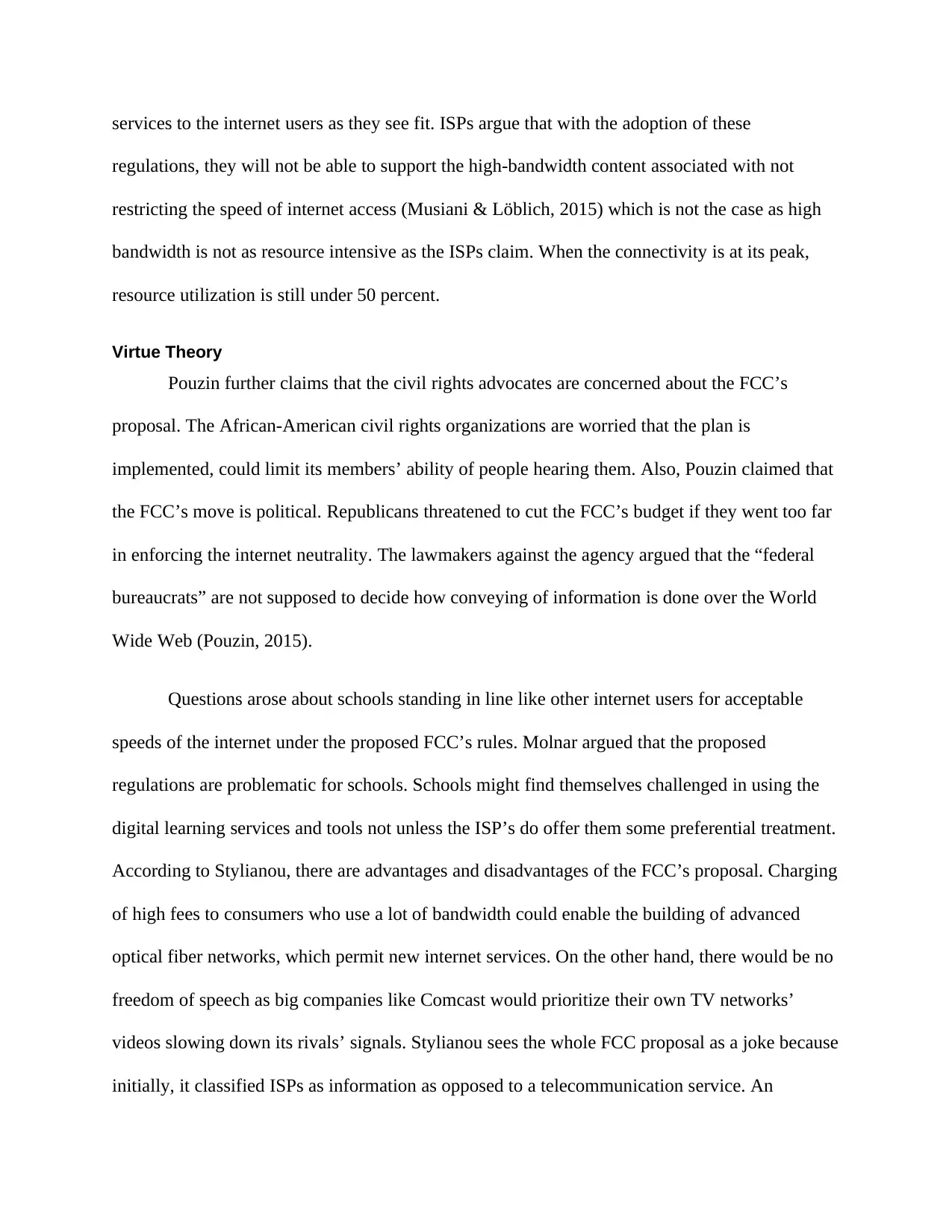
services to the internet users as they see fit. ISPs argue that with the adoption of these
regulations, they will not be able to support the high-bandwidth content associated with not
restricting the speed of internet access (Musiani & Löblich, 2015) which is not the case as high
bandwidth is not as resource intensive as the ISPs claim. When the connectivity is at its peak,
resource utilization is still under 50 percent.
Virtue Theory
Pouzin further claims that the civil rights advocates are concerned about the FCC’s
proposal. The African-American civil rights organizations are worried that the plan is
implemented, could limit its members’ ability of people hearing them. Also, Pouzin claimed that
the FCC’s move is political. Republicans threatened to cut the FCC’s budget if they went too far
in enforcing the internet neutrality. The lawmakers against the agency argued that the “federal
bureaucrats” are not supposed to decide how conveying of information is done over the World
Wide Web (Pouzin, 2015).
Questions arose about schools standing in line like other internet users for acceptable
speeds of the internet under the proposed FCC’s rules. Molnar argued that the proposed
regulations are problematic for schools. Schools might find themselves challenged in using the
digital learning services and tools not unless the ISP’s do offer them some preferential treatment.
According to Stylianou, there are advantages and disadvantages of the FCC’s proposal. Charging
of high fees to consumers who use a lot of bandwidth could enable the building of advanced
optical fiber networks, which permit new internet services. On the other hand, there would be no
freedom of speech as big companies like Comcast would prioritize their own TV networks’
videos slowing down its rivals’ signals. Stylianou sees the whole FCC proposal as a joke because
initially, it classified ISPs as information as opposed to a telecommunication service. An
regulations, they will not be able to support the high-bandwidth content associated with not
restricting the speed of internet access (Musiani & Löblich, 2015) which is not the case as high
bandwidth is not as resource intensive as the ISPs claim. When the connectivity is at its peak,
resource utilization is still under 50 percent.
Virtue Theory
Pouzin further claims that the civil rights advocates are concerned about the FCC’s
proposal. The African-American civil rights organizations are worried that the plan is
implemented, could limit its members’ ability of people hearing them. Also, Pouzin claimed that
the FCC’s move is political. Republicans threatened to cut the FCC’s budget if they went too far
in enforcing the internet neutrality. The lawmakers against the agency argued that the “federal
bureaucrats” are not supposed to decide how conveying of information is done over the World
Wide Web (Pouzin, 2015).
Questions arose about schools standing in line like other internet users for acceptable
speeds of the internet under the proposed FCC’s rules. Molnar argued that the proposed
regulations are problematic for schools. Schools might find themselves challenged in using the
digital learning services and tools not unless the ISP’s do offer them some preferential treatment.
According to Stylianou, there are advantages and disadvantages of the FCC’s proposal. Charging
of high fees to consumers who use a lot of bandwidth could enable the building of advanced
optical fiber networks, which permit new internet services. On the other hand, there would be no
freedom of speech as big companies like Comcast would prioritize their own TV networks’
videos slowing down its rivals’ signals. Stylianou sees the whole FCC proposal as a joke because
initially, it classified ISPs as information as opposed to a telecommunication service. An
Paraphrase This Document
Need a fresh take? Get an instant paraphrase of this document with our AI Paraphraser
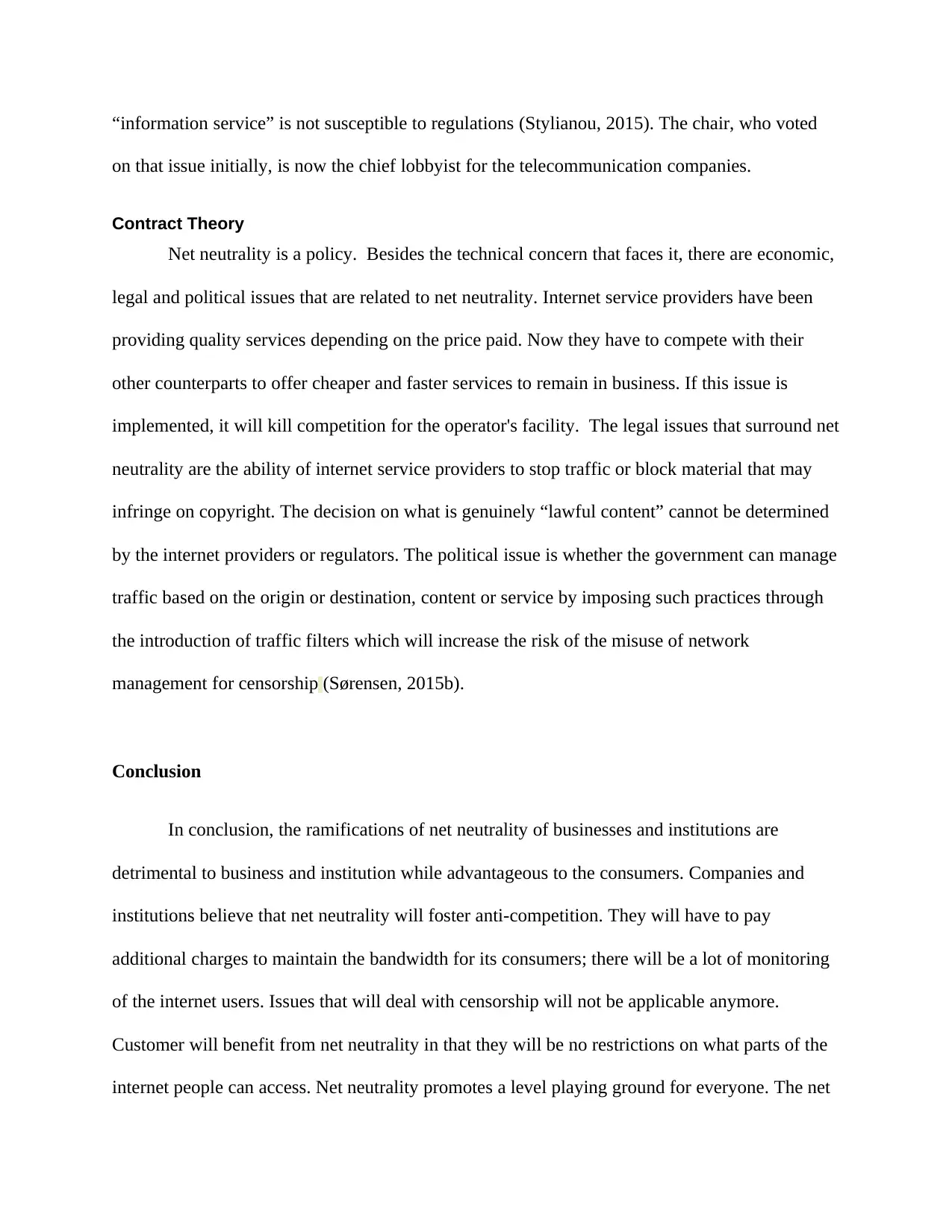
“information service” is not susceptible to regulations (Stylianou, 2015). The chair, who voted
on that issue initially, is now the chief lobbyist for the telecommunication companies.
Contract Theory
Net neutrality is a policy. Besides the technical concern that faces it, there are economic,
legal and political issues that are related to net neutrality. Internet service providers have been
providing quality services depending on the price paid. Now they have to compete with their
other counterparts to offer cheaper and faster services to remain in business. If this issue is
implemented, it will kill competition for the operator's facility. The legal issues that surround net
neutrality are the ability of internet service providers to stop traffic or block material that may
infringe on copyright. The decision on what is genuinely “lawful content” cannot be determined
by the internet providers or regulators. The political issue is whether the government can manage
traffic based on the origin or destination, content or service by imposing such practices through
the introduction of traffic filters which will increase the risk of the misuse of network
management for censorship (Sørensen, 2015b).
Conclusion
In conclusion, the ramifications of net neutrality of businesses and institutions are
detrimental to business and institution while advantageous to the consumers. Companies and
institutions believe that net neutrality will foster anti-competition. They will have to pay
additional charges to maintain the bandwidth for its consumers; there will be a lot of monitoring
of the internet users. Issues that will deal with censorship will not be applicable anymore.
Customer will benefit from net neutrality in that they will be no restrictions on what parts of the
internet people can access. Net neutrality promotes a level playing ground for everyone. The net
on that issue initially, is now the chief lobbyist for the telecommunication companies.
Contract Theory
Net neutrality is a policy. Besides the technical concern that faces it, there are economic,
legal and political issues that are related to net neutrality. Internet service providers have been
providing quality services depending on the price paid. Now they have to compete with their
other counterparts to offer cheaper and faster services to remain in business. If this issue is
implemented, it will kill competition for the operator's facility. The legal issues that surround net
neutrality are the ability of internet service providers to stop traffic or block material that may
infringe on copyright. The decision on what is genuinely “lawful content” cannot be determined
by the internet providers or regulators. The political issue is whether the government can manage
traffic based on the origin or destination, content or service by imposing such practices through
the introduction of traffic filters which will increase the risk of the misuse of network
management for censorship (Sørensen, 2015b).
Conclusion
In conclusion, the ramifications of net neutrality of businesses and institutions are
detrimental to business and institution while advantageous to the consumers. Companies and
institutions believe that net neutrality will foster anti-competition. They will have to pay
additional charges to maintain the bandwidth for its consumers; there will be a lot of monitoring
of the internet users. Issues that will deal with censorship will not be applicable anymore.
Customer will benefit from net neutrality in that they will be no restrictions on what parts of the
internet people can access. Net neutrality promotes a level playing ground for everyone. The net
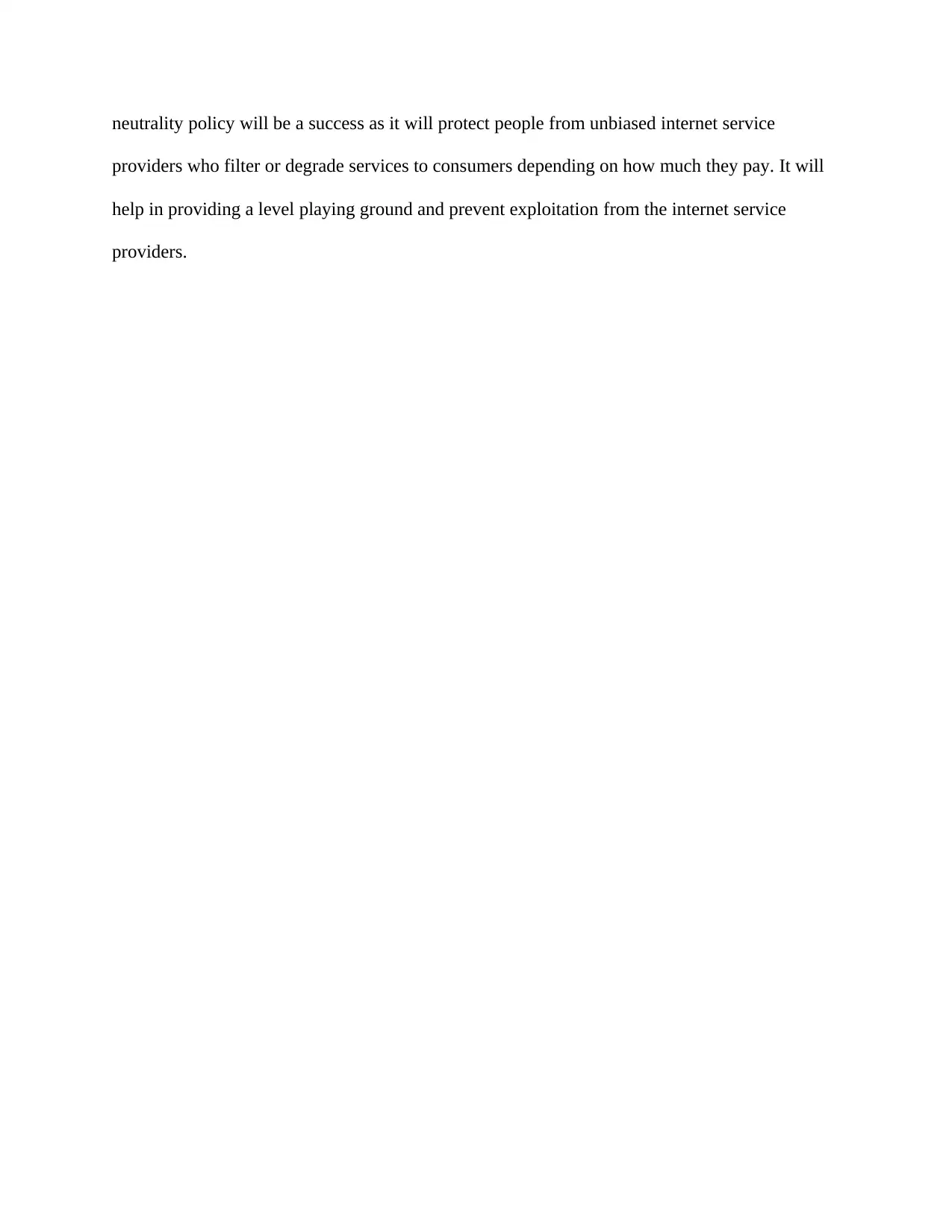
neutrality policy will be a success as it will protect people from unbiased internet service
providers who filter or degrade services to consumers depending on how much they pay. It will
help in providing a level playing ground and prevent exploitation from the internet service
providers.
providers who filter or degrade services to consumers depending on how much they pay. It will
help in providing a level playing ground and prevent exploitation from the internet service
providers.
⊘ This is a preview!⊘
Do you want full access?
Subscribe today to unlock all pages.

Trusted by 1+ million students worldwide
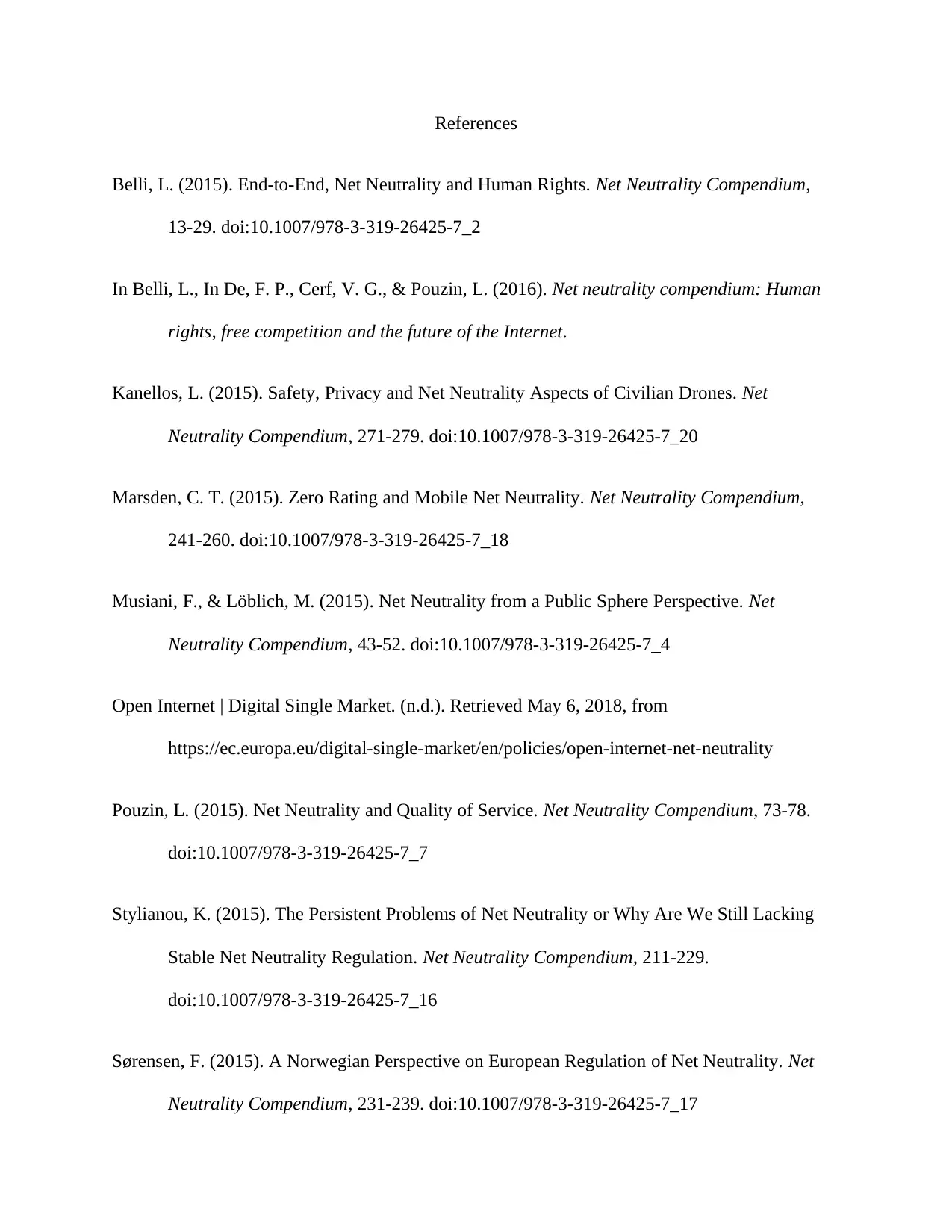
References
Belli, L. (2015). End-to-End, Net Neutrality and Human Rights. Net Neutrality Compendium,
13-29. doi:10.1007/978-3-319-26425-7_2
In Belli, L., In De, F. P., Cerf, V. G., & Pouzin, L. (2016). Net neutrality compendium: Human
rights, free competition and the future of the Internet.
Kanellos, L. (2015). Safety, Privacy and Net Neutrality Aspects of Civilian Drones. Net
Neutrality Compendium, 271-279. doi:10.1007/978-3-319-26425-7_20
Marsden, C. T. (2015). Zero Rating and Mobile Net Neutrality. Net Neutrality Compendium,
241-260. doi:10.1007/978-3-319-26425-7_18
Musiani, F., & Löblich, M. (2015). Net Neutrality from a Public Sphere Perspective. Net
Neutrality Compendium, 43-52. doi:10.1007/978-3-319-26425-7_4
Open Internet | Digital Single Market. (n.d.). Retrieved May 6, 2018, from
https://ec.europa.eu/digital-single-market/en/policies/open-internet-net-neutrality
Pouzin, L. (2015). Net Neutrality and Quality of Service. Net Neutrality Compendium, 73-78.
doi:10.1007/978-3-319-26425-7_7
Stylianou, K. (2015). The Persistent Problems of Net Neutrality or Why Are We Still Lacking
Stable Net Neutrality Regulation. Net Neutrality Compendium, 211-229.
doi:10.1007/978-3-319-26425-7_16
Sørensen, F. (2015). A Norwegian Perspective on European Regulation of Net Neutrality. Net
Neutrality Compendium, 231-239. doi:10.1007/978-3-319-26425-7_17
Belli, L. (2015). End-to-End, Net Neutrality and Human Rights. Net Neutrality Compendium,
13-29. doi:10.1007/978-3-319-26425-7_2
In Belli, L., In De, F. P., Cerf, V. G., & Pouzin, L. (2016). Net neutrality compendium: Human
rights, free competition and the future of the Internet.
Kanellos, L. (2015). Safety, Privacy and Net Neutrality Aspects of Civilian Drones. Net
Neutrality Compendium, 271-279. doi:10.1007/978-3-319-26425-7_20
Marsden, C. T. (2015). Zero Rating and Mobile Net Neutrality. Net Neutrality Compendium,
241-260. doi:10.1007/978-3-319-26425-7_18
Musiani, F., & Löblich, M. (2015). Net Neutrality from a Public Sphere Perspective. Net
Neutrality Compendium, 43-52. doi:10.1007/978-3-319-26425-7_4
Open Internet | Digital Single Market. (n.d.). Retrieved May 6, 2018, from
https://ec.europa.eu/digital-single-market/en/policies/open-internet-net-neutrality
Pouzin, L. (2015). Net Neutrality and Quality of Service. Net Neutrality Compendium, 73-78.
doi:10.1007/978-3-319-26425-7_7
Stylianou, K. (2015). The Persistent Problems of Net Neutrality or Why Are We Still Lacking
Stable Net Neutrality Regulation. Net Neutrality Compendium, 211-229.
doi:10.1007/978-3-319-26425-7_16
Sørensen, F. (2015). A Norwegian Perspective on European Regulation of Net Neutrality. Net
Neutrality Compendium, 231-239. doi:10.1007/978-3-319-26425-7_17
Paraphrase This Document
Need a fresh take? Get an instant paraphrase of this document with our AI Paraphraser
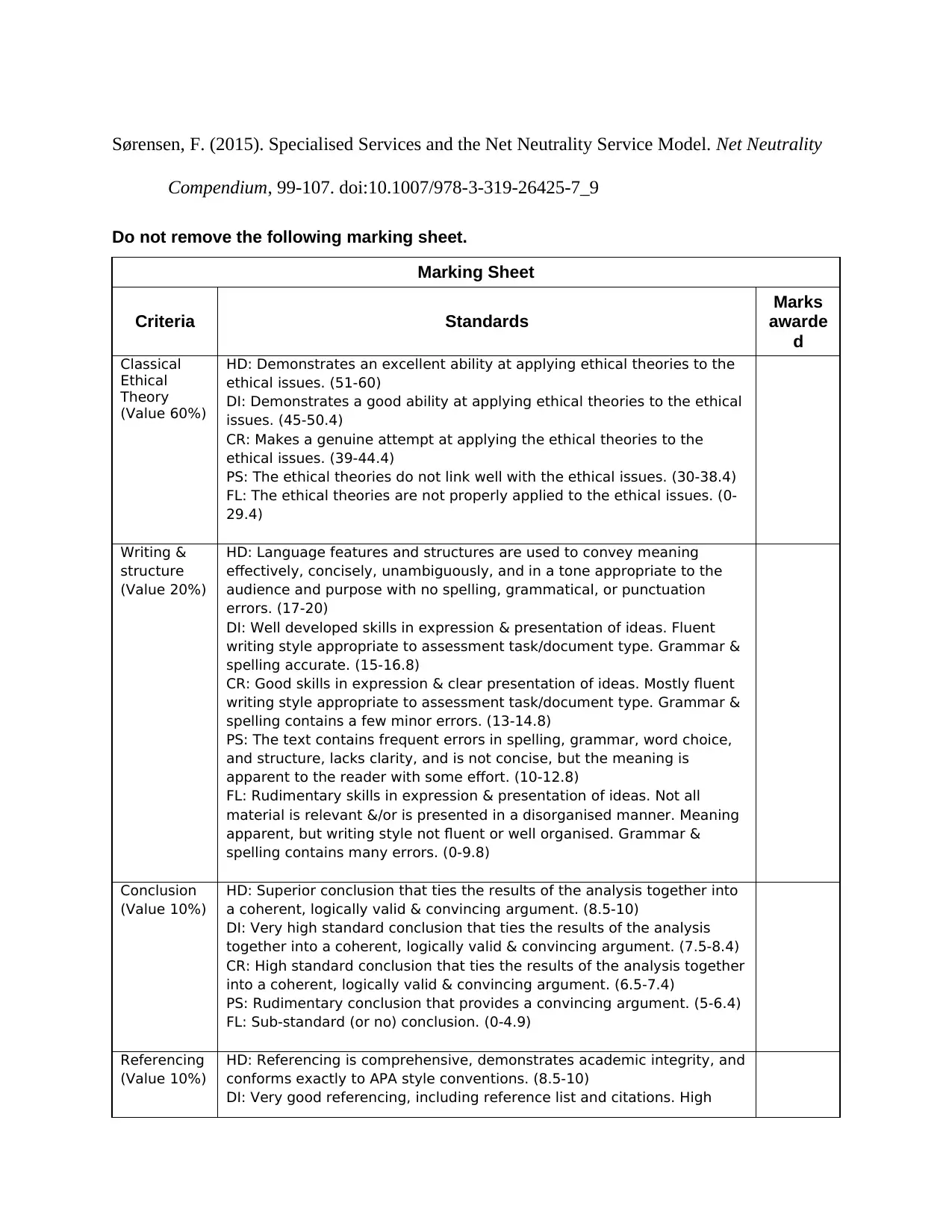
Sørensen, F. (2015). Specialised Services and the Net Neutrality Service Model. Net Neutrality
Compendium, 99-107. doi:10.1007/978-3-319-26425-7_9
Do not remove the following marking sheet.
Marking Sheet
Criteria Standards
Marks
awarde
d
Classical
Ethical
Theory
(Value 60%)
HD: Demonstrates an excellent ability at applying ethical theories to the
ethical issues. (51-60)
DI: Demonstrates a good ability at applying ethical theories to the ethical
issues. (45-50.4)
CR: Makes a genuine attempt at applying the ethical theories to the
ethical issues. (39-44.4)
PS: The ethical theories do not link well with the ethical issues. (30-38.4)
FL: The ethical theories are not properly applied to the ethical issues. (0-
29.4)
Writing &
structure
(Value 20%)
HD: Language features and structures are used to convey meaning
effectively, concisely, unambiguously, and in a tone appropriate to the
audience and purpose with no spelling, grammatical, or punctuation
errors. (17-20)
DI: Well developed skills in expression & presentation of ideas. Fluent
writing style appropriate to assessment task/document type. Grammar &
spelling accurate. (15-16.8)
CR: Good skills in expression & clear presentation of ideas. Mostly fluent
writing style appropriate to assessment task/document type. Grammar &
spelling contains a few minor errors. (13-14.8)
PS: The text contains frequent errors in spelling, grammar, word choice,
and structure, lacks clarity, and is not concise, but the meaning is
apparent to the reader with some effort. (10-12.8)
FL: Rudimentary skills in expression & presentation of ideas. Not all
material is relevant &/or is presented in a disorganised manner. Meaning
apparent, but writing style not fluent or well organised. Grammar &
spelling contains many errors. (0-9.8)
Conclusion
(Value 10%)
HD: Superior conclusion that ties the results of the analysis together into
a coherent, logically valid & convincing argument. (8.5-10)
DI: Very high standard conclusion that ties the results of the analysis
together into a coherent, logically valid & convincing argument. (7.5-8.4)
CR: High standard conclusion that ties the results of the analysis together
into a coherent, logically valid & convincing argument. (6.5-7.4)
PS: Rudimentary conclusion that provides a convincing argument. (5-6.4)
FL: Sub-standard (or no) conclusion. (0-4.9)
Referencing
(Value 10%)
HD: Referencing is comprehensive, demonstrates academic integrity, and
conforms exactly to APA style conventions. (8.5-10)
DI: Very good referencing, including reference list and citations. High
Compendium, 99-107. doi:10.1007/978-3-319-26425-7_9
Do not remove the following marking sheet.
Marking Sheet
Criteria Standards
Marks
awarde
d
Classical
Ethical
Theory
(Value 60%)
HD: Demonstrates an excellent ability at applying ethical theories to the
ethical issues. (51-60)
DI: Demonstrates a good ability at applying ethical theories to the ethical
issues. (45-50.4)
CR: Makes a genuine attempt at applying the ethical theories to the
ethical issues. (39-44.4)
PS: The ethical theories do not link well with the ethical issues. (30-38.4)
FL: The ethical theories are not properly applied to the ethical issues. (0-
29.4)
Writing &
structure
(Value 20%)
HD: Language features and structures are used to convey meaning
effectively, concisely, unambiguously, and in a tone appropriate to the
audience and purpose with no spelling, grammatical, or punctuation
errors. (17-20)
DI: Well developed skills in expression & presentation of ideas. Fluent
writing style appropriate to assessment task/document type. Grammar &
spelling accurate. (15-16.8)
CR: Good skills in expression & clear presentation of ideas. Mostly fluent
writing style appropriate to assessment task/document type. Grammar &
spelling contains a few minor errors. (13-14.8)
PS: The text contains frequent errors in spelling, grammar, word choice,
and structure, lacks clarity, and is not concise, but the meaning is
apparent to the reader with some effort. (10-12.8)
FL: Rudimentary skills in expression & presentation of ideas. Not all
material is relevant &/or is presented in a disorganised manner. Meaning
apparent, but writing style not fluent or well organised. Grammar &
spelling contains many errors. (0-9.8)
Conclusion
(Value 10%)
HD: Superior conclusion that ties the results of the analysis together into
a coherent, logically valid & convincing argument. (8.5-10)
DI: Very high standard conclusion that ties the results of the analysis
together into a coherent, logically valid & convincing argument. (7.5-8.4)
CR: High standard conclusion that ties the results of the analysis together
into a coherent, logically valid & convincing argument. (6.5-7.4)
PS: Rudimentary conclusion that provides a convincing argument. (5-6.4)
FL: Sub-standard (or no) conclusion. (0-4.9)
Referencing
(Value 10%)
HD: Referencing is comprehensive, demonstrates academic integrity, and
conforms exactly to APA style conventions. (8.5-10)
DI: Very good referencing, including reference list and citations. High
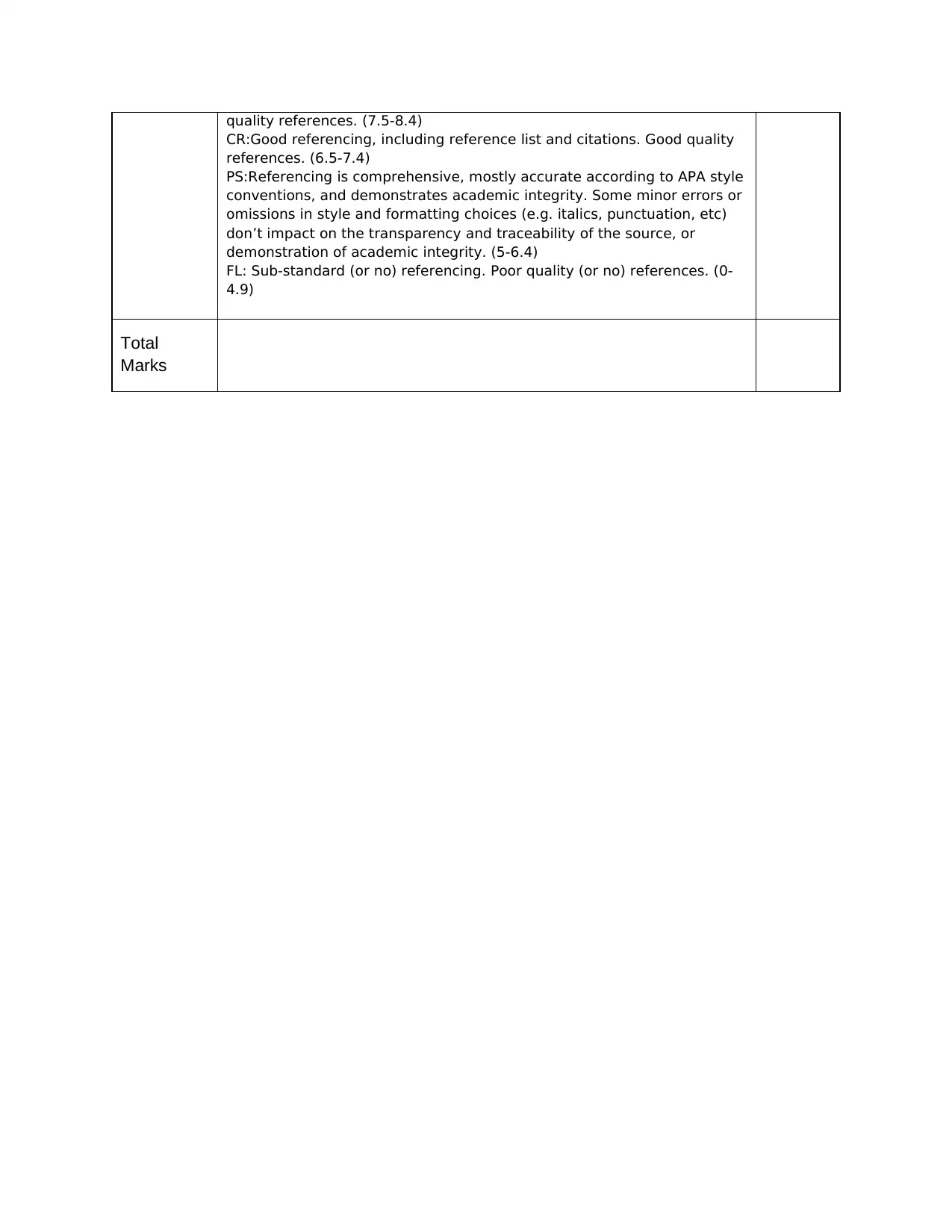
quality references. (7.5-8.4)
CR:Good referencing, including reference list and citations. Good quality
references. (6.5-7.4)
PS:Referencing is comprehensive, mostly accurate according to APA style
conventions, and demonstrates academic integrity. Some minor errors or
omissions in style and formatting choices (e.g. italics, punctuation, etc)
don’t impact on the transparency and traceability of the source, or
demonstration of academic integrity. (5-6.4)
FL: Sub-standard (or no) referencing. Poor quality (or no) references. (0-
4.9)
Total
Marks
CR:Good referencing, including reference list and citations. Good quality
references. (6.5-7.4)
PS:Referencing is comprehensive, mostly accurate according to APA style
conventions, and demonstrates academic integrity. Some minor errors or
omissions in style and formatting choices (e.g. italics, punctuation, etc)
don’t impact on the transparency and traceability of the source, or
demonstration of academic integrity. (5-6.4)
FL: Sub-standard (or no) referencing. Poor quality (or no) references. (0-
4.9)
Total
Marks
⊘ This is a preview!⊘
Do you want full access?
Subscribe today to unlock all pages.

Trusted by 1+ million students worldwide
1 out of 9
Related Documents
Your All-in-One AI-Powered Toolkit for Academic Success.
+13062052269
info@desklib.com
Available 24*7 on WhatsApp / Email
![[object Object]](/_next/static/media/star-bottom.7253800d.svg)
Unlock your academic potential
Copyright © 2020–2026 A2Z Services. All Rights Reserved. Developed and managed by ZUCOL.





